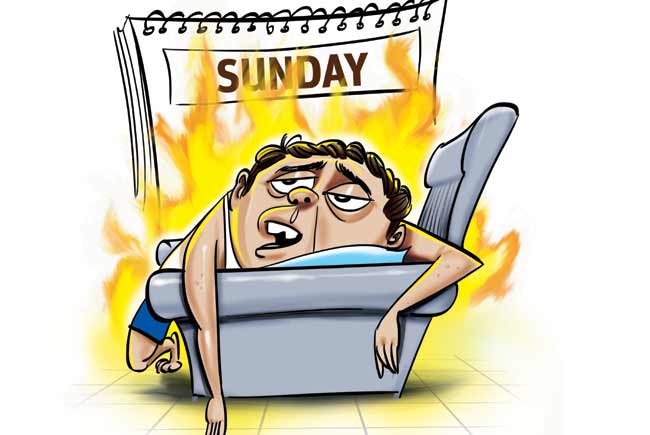In March, someone or other will say, in that tone of timeless wisdom, as if they have grown up close to nature, surviving on berries and natural light, ki summer starts after Holi

![]() In March, someone or other will say, in that tone of timeless wisdom, as if they have grown up close to nature, surviving on berries and natural light, ki summer starts after Holi.
In March, someone or other will say, in that tone of timeless wisdom, as if they have grown up close to nature, surviving on berries and natural light, ki summer starts after Holi.
That’s not true. Summer starts on a Sunday.

Illustration/ Amit Bandre
Like so — you sleep late on Saturday because you’ve been partying so hard (oh, ok, fine, because you’ve watched the whole week’s worth of House of Cards till 3 am). Waking up on Sunday, your mouth feels extra dry. All the leaves on the tree outside your window are playing statue. They look unattractively overexposed with sunlight. You swing your legs over the side of the bed, and when your feet touch the floor, it is not cold. You realise, summer has come.
After that you feel you have permission to lie around consuming pale liquids — self-deluding shandies (“Arre, it’s more or less lemondade only.”), vodka and cocounut water (“Coconut water is hydrating.”), gin and tonic (“Arre, the British invented tonic to prevent malaria.”). You take several showers but always change into something resembling nightclothes.
Summer legitimises sluggishness, laziness, gazing into the distance, excuses for not leaving the house or not getting off the sofa as you read your horoscope in six Sunday papers, the delirium of XXL afternoon naps. Some strict friends of mine may point out I do this all year (ignore them please) but summer makes it official.
Summer came differently when I was young. That’s climate change for you. Those days summer came on the day of the last final exam.
After many nights of asking your hostel mates to wake you up after one hour, hoping to complete the year’s syllabus between 3 am and 7 am, then actually waking up at 6 and trying to finish it in an hour; after the doomsday afternoons when you trudged back, even the elastic in your socks having given up, calculating marks based on the hope that your guiding spirit (the soul of an ancient medicine man) had helped you to make just enough right guesses to pass in chemistry (no it had not), an afternoon came when you did not have any more exams. Your days would no longer crouch, waiting to pounce when you failed to live up to them. You were free.
On that afternoon, with the smell of lunch phulkas puffing up on the fire suddenly sharp, you could chuck your bag on the floor, you could lie in bed and float, you could postpone inevitable doom for a couple of months. You could fantasise about the coming holidays — how lazy you would be, the books you would read, how voluptuously time would undulate around you. At that moment you would become aware of a heightened dryness, a secret garden silence, the isolation of the afternoon. And you’d realise with a smile, summer had arrived.
Now, of course all life is exam time. All dreams are anxiety dreams — grown up versions of studying for maths when you had geography. But instead of saying one more hour of sleep, one more chapter of my book, then I’ll study, we worry that we are not studying enough. We scold ourselves for wasting time, not making it through our punishing to-do lists, not being up to the minute, retweeted enough, cool enough — not coming first in class. We scorn ourselves as losers because we doubt our simplest human desire — to sometimes be slowpokes and back benchers, sometimes be just another leaf, content with being on the tree.
That is why, summer comes on Sunday, to tell us, it’s OK.
Paromita Vohra is an award-winning Mumbai-based filmmaker, writer and curator working with fiction and non-fiction. Reach her at www.parodevi.com.
The views expressed in this column are the individual’s and don’t represent those of the paper.
 Subscribe today by clicking the link and stay updated with the latest news!" Click here!
Subscribe today by clicking the link and stay updated with the latest news!" Click here!









